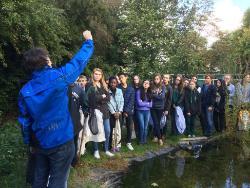Back to school with the Institute of Research in School
As students head back to school in their droves, we catch up with Dr Lizzie Rushton, Head of Evidence and Evaluation, Institute for Research in Schools and Honorary Senior Research Associate, UCL Institute of Education, on their innovative public engagement scheme to bring cutting edge research into the classroom.

IRIS students learning about biodiversity sampling for Well World Credit: Sam Goodfellow
Public engagement with research science is ever expanding, with projects involving people from many walks of life enabling the widening of participation in academic science. Science teachers are uniquely placed to communicate the wonder and excitement of science and to engage young people and their families in the world of scientific research. However, more scientists need to identify opportunities where teachers and their students can make a genuine contribution.
We at IRIS (the Institute for Research in Schools) have been supporting schools across the UK to work with partners including the University of Oxford, CERN and the Wellcome Sanger Institute, so that teachers and technicians can contribute to active science research in collaboration with their students. Projects include students analysing data from the Large Hadron Collider in the Higgs Hunters project, annotating the human whipworm genome in the Genome Decoders project or exploring the links between physical and mental well-being and biodiversity in the Well World project. Research in schools is typically a team effort, with many students spending their lunch hour or afterschool time working together on projects or sharing their findings with local schools and community groups.
Teachers have found this experience incredibly rewarding. Many teachers are reconnecting with their love of science, having not been involved in research since their undergraduate studies. One teacher working on the Well World project said:
‘After this experience of research I would be far more likely to describe myself as a scientist which, in some ways is surprising as I have taught science to students for over 20 years, but it is that connection with current research and academics and being part of the understanding of new science that I think has made me feel far more likely to describe myself as a scientist.’
Another teacher, working on the Genome Decoders project said:
‘This project has been hugely beneficial for my students and myself, it has really connected back to my roots as a scientist. I have so enjoyed the contact with the research scientists and working on this project with other teachers and students, it has really been such a positive collaboration that I am proud to be a part of.’
As this group of highly skilled professionals return to their classrooms and laboratories this month, consider how you could work with IRIS to bring your research into schools, so that teachers and their students can engage with your research and could perhaps become a collaborator.
Find out more about the Insitute of Research in Schools.